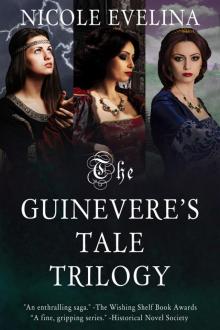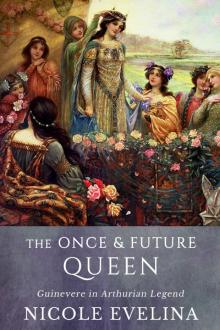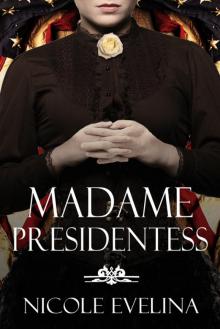- Home
- Nicole Evelina
Guinevere's Tale Page 3
Guinevere's Tale Read online
Page 3
“No, I think she is very much human.” I turned back to Grainne. “I just wish she were more forthcoming. I never know what she is thinking, and that unnerves me.”
Grainne smirked as a placid, lightly accented voice floated over my shoulder. “I think it is unkind to speak of others outside their presence.”
I whirled around. Morgan had materialized silently behind me, her slate blue eyes flashing. Maybe Grainne was right about her otherworldly bloodlines.
An amused smile played on Morgan’s lips. “Viviane told me to tell you we all passed the test.”
The others whooped and hooted with joy.
“There is only room for one favorite among us,” Morgan quietly added to me. “That title is mine, and I intend to keep it. You’ll have to try much harder if you wish to best me.”
As summer wore on, Morgan’s declaration of dominance ate at me. I was used to getting my way unchallenged, and to make matters worse, I was also used to being the best and brightest of the cohort my mother instructed back home. So I was ill-equipped to endure my rival’s constant assertion of superiority.
At first, I took the passive route, hoping she would be satisfied, forget me, and move on to hating someone else. I let her think she was superior even when I knew my skill to be greater and frequently resorted to false flattery, but Morgan saw through me every time. To truly win her over, I would have to openly admit my inferiority before the rest of the House of Nine, bowing and scraping like a slave before her master. That was the one thing I would not do, and she knew it.
So our competition slowly became a battle of wills. We found tiny ways to trip one another up or gain advantage—petty things like toppled ink pots, missing vials of herbs, and well-timed pinches that forced one another to break the solemnity of ritual—childish pranks we thought went unnoticed by anyone else. That is, until one day in early winter when Argante asked us to remain with her after our lesson ended.
We were learning the basic tenants of law, which at our early level consisted of memorizing categories of possible dispute—property, contracts, and crimes—along with their corresponding value or punishment. After eight months of study, we could easily recite the equivalent value of a cumal of rich farmland versus one of poor, rocky soil, or how to determine the honor price owed to a father for a bride. While not as exciting as divination or as entertaining as learning epic bardic poetry, it was equally important. Someday, as priestesses, we might be called upon by kings or lords to settle matters of law they did not want or were unqualified to decide themselves.
Argante had just returned from such a journey, where she’d adjudicated several cases for the new lord of the Summer Country, a young tribal prince named Malegant who, according to rumor, had managed to overthrow his own mother, as well as kill or subdue nearly a dozen siblings who contested his right to the throne. The resulting kingdom was a blend of three previous tribal holdings, and peace was tenuous at best. He’d had the foresight to call on Argante for aid, and she had been using some of the examples from his court to instruct us.
“I have called you apart from the others because I have a special case to present to you, one I would normally pose only to advanced students. I believe because of your superior skills and wit, you will rise to the challenge. Imagine yourselves the judges of this scenario. A man takes a second wife—”
“Does that happen anymore?” I asked, not realizing I had voiced my thought aloud, until Argante pinned me with an outraged expression that answered louder than her voice ever could have. I’d better not interrupt her again.
“A man takes a second wife,” she repeated. “His first wife is displeased and kills her. Is she to be held guilty or not?”
This situation was a matter of tradition, one told in bardic lore from ages long past, before the coming of the Romans, so we were familiar with the idea, even though our studies had not yet reached that level of complexity.
“Does he have sons? When did the murder take place?” Morgan asked.
“Ah, now you are getting to the heart of the matter.” Argante gestured with her index finger as she spoke. “He had no sons, and the murder took place two days after his second wedding.”
Morgan wrinkled her brow. “Then no, she is guilty of no crime and no punishment should be given. If the second wife dies within the first three nights of marriage, then the primary wife is held blameless, regardless of her actions.”
“The primary wife would have to pay a fine to the victim’s kin, whether or not she was within her rights,” I corrected Morgan.
Argante turned to me. “And if the second wife’s family seeks vengeance?”
“If the family takes revenge, they do so at their own peril, unless they hire outlaws to do their bidding,” I answered.
“And why is that permitted?” Argante asked Morgan.
“Because outlaws are not held to the same code as those with tribal ties. The only way to impose the law on a band of outlaws is to hire your own, and even then, they may turn on you.”
“Exactly.” Argante nodded and clapped her hands together, pleased. “Now what if the husband kills the first wife out of anger for her act? How is he to be punished? Is he put to the sword, or does he pay a heavy fine and enter slavery for a number of years? Or is there another alternative?”
Morgan and I looked at one another, puzzled. That was well beyond our ken. I decided to keep silent.
Morgan attempted to form an answer but never made it beyond stuttering, “I-I-he. . .”
Argante fixed us in her solemn gaze. “I did not expect you to know the answer. You see, ladies, you have just proven you are equals both in knowledge and ignorance. Stop trying to best one another, and concentrate on your studies. You only hurt yourselves by directing your attention elsewhere. Now go join your sisters.”
Morgan was silent as we made our way out the door, but then we moved out of earshot of our teacher.
“We are not finished,” she sneered.
Hours later, in the deep stillness of night, I woke with a startled gasp, one hand pressed protectively over my racing heart, the other clamped in a fist at my side, still holding my one piece of home—a small wooden dog that had been my going-away present.
Sometimes the door of my mind would not stay shut. Most of the time it was locked to even gales, but in my weaker moments, just the slightest whisper of a memory was enough to release the lock and let the sight slip in like a winter draft.
Fighting to see through the cobwebs left behind by my nightmare, I sat up and gazed around at the other girls sleeping soundly all around me. Rowena was facing me in the next bed, a slight smile upon her lips, one arm tucked beneath her head, the other thrown carelessly above it. At least I had not woken them in my fright.
I lay back down, focusing on my breathing as the snow swirled outside the window facing the Tor, blanketing the isle in a glimmering cape of white. Slowly, I went through the steps of shutting my mind to the sight, trying to forget the terror that came with it.
That was one of the strange things about visions that came unbidden. Even after the images faded, the emotions they conjured remained. Tonight it was the bittersweet dregs of the Holy Grail, with its sanguine promise of peace offset by the rumbling threat of destruction. This was a dream that had haunted me for as long as I could remember. I suspected it was my confession of this dream, more than my recurring visions or my mother’s vow, which had prompted Viviane to bring me here. The Grail was one of Avalon’s clandestine treasures, and anyone who knew of it belonged here, safe behind the mists.
I shivered and drew the blanket closer around me. In the months that had passed since I came to Avalon, my visions had dwindled in number and more time elapsed between them, but they did not cease as Viviane had hoped. Argante told me they probably never would but echoed Viviane’s promise that with training, I could control them. However, she warned that I would never be
totally in control. Weakness, she said, was the strongest trigger, even for a woman of many years like herself. Each one of us, just by being alive, was subject to its many whims. Even with all the training Avalon could provide, illness, fatigue, or even strong emotions such as love or fear could render us powerless to the sight.
I bit my lower lip, trying to decide what had prompted this dream. I was healthy and my initial fear of life on the isle had faded, so that left one possible trigger—some strong emotion. Even without much thought, I knew what it was. Hatred. It burned in my belly even as I turned the previous day’s events over in my mind. Morgan’s refusal to let go of her quest for dominance over me, even after Argante’s strict admonition, set me on edge. I was done fighting, but Morgan never would be, at least not until she saw me trod down once and for all.
Suddenly, a sound as soft as the tease of a feather captured my attention. I lifted my head slightly off the pillow. It came again, more distinct this time, a small cry almost like the mewing of a kitten. I lifted myself onto my forearm and scanned the beds. One was empty. Wrapping the heavy fur blanket around me, I followed the sound, my bare feet swishing softly on the cold floor.
I could just make out a small figure hunched on the thick white rug in front of the fire. As I drew nearer, I recognized Mona’s silhouette.
I crossed my ankles and sank down silently beside her, wrapping my arm and half of the blanket around her. She nestled into my embrace like a baby bird beneath its mother’s wing. Neither of us spoke, for we both knew the source of her grief. Whether by design or malevolent coincidence, Mona had been named after a holy island off the coast of my father’s kingdom of Gwynedd, which had been home to the Druids before its inhabitants were slaughtered by a power-crazed Roman governor, an event she frequently relived in her dreams.
When I first joined the House of Nine, I thought her a banshee, but by now, I was so used to her screams in the night that I usually turned over and went back to sleep whenever she woke me. But something was different tonight. Maybe it was because of my own nightmare, but I wanted to keep watch with her, to hold her until her tears ceased and she finally succumbed to sleep.
After a long silence, Mona spoke, hiccupping through her tears. “I asked Argante today why I am cursed.”
“What? Why?”
“By the nightmares, I mean. She told me the sight works differently in every person. Some can see the future, while others are given the gift of seeing distant things as they occur or, in my case, long after.”
“But I still do not understand. It seems pointless to repeat the same events over and over again, even if only in our minds.” I stroked her hair, gazing off into the distance as I thought of my own visions and felt anew the frustration of reliving tragic events and portents without any understanding of why.
“That is exactly what I thought, so I asked her what value there is in seeing the past. She did not really answer me but went into one of her lectures.”
“What did she say?”
Mona shifted around so she was facing me. Distracted by her story, she had finally stopped crying. She adopted a dignified pose and mimicked Argante’s regal voice, quoting her while being careful not to wake the others. “‘How can we ever plan a better future if we do not learn from our past? If you burned your hand but did not remember the pain, how would you know not to touch the flame again? It is the same in battle or politics. If no one remembers the successes and failures, then our lives are but one pointless circle with no hope that future generations will advance. Knowing someone’s past gives special insight into their motivations, which is much like being inside their minds. Do not discount the gift you have been given. If you develop it properly, it is a blessing that could prove very useful.’”
We were both silent for a moment.
“How very”—I searched for the right word—“cryptic. Do you feel any better?”
She shook her head. “Not really, but at least I know Argante sees potential in me, in my condition. What is that?” She pointed at the object clutched in my left hand.
I opened my palm, having completely forgotten I was holding anything. In it lay the small wooden carving of a dog. Peredur, the young son of my lady’s maid, had given it to me as a farewell present on my last day in Northgallis. It had been a gift from his own father to help him conquer his fear of the dark. My palm was still etched with its imprint, made as I was clutching it in my sleep.
“This”—I gave Mona a squeeze—“is a magic wolfhound. He protects you from all your fears. I have been sleeping with it to combat my homesickness, but maybe you should keep him for a while.”
Mona took the toy from my hand and examined it in the firelight. “I think he is one of Ellen’s own,” she said with awe, referring to the goddess of all journeys, even in the land of dreams.
“He doesn’t appear much of a protector,” interjected a bored voice from the dark depths of the room.
We both turned. Morgan stood in the shadows, her blanket trailing after her like a cape.
“Considering you are both awake, I would say he is not doing his job,” she said, sitting down on Mona’s other side.
“And what is your excuse?” I countered, annoyed at her interruption of a private moment.
Morgan narrowed her sleep-ringed eyes at me. “Who could sleep with the two of you chattering away like squirrels?”
“Have you been listening long?” Mona asked, a mixture of embarrassment and distrust in her voice.
“Long enough. I-I came over to ask you a favor.” Morgan inclined her head to Mona and pursed her lips, as though unsure if she should go on in my presence.
“You could simply ask, if you want privacy,” I pointed out to Morgan. I rose, leaving my blanket with Mona. I would take the one from her bed. “Good night, Mona. I hope you feel better.”
She waved the wooden dog at me. “Of course I do.”
I padded back to bed, slowing my pace just enough to catch a hint of Morgan’s request.
“I heard what Argante told you. Will you try to see my past? It would mean very much to me to know where I come from.”
Mona’s voice lost its edge and once again radiated her natural warmth. “I don’t think it works that way, but I will try.”
I pulled Mona’s blanket around me as I padded back to my bed, pondering this turn of events. So the rumors were true. Perfect little Morgan had a weakness after all—she was an orphan, at least as far as she knew. That meant she had no kin, no tribe to return to, no life save that which she had built on this isle. She was utterly beholden to the whims of Avalon. No wonder she was so anxious to secure her place as favorite daughter.
Well, she would have to fight me for it. I knew it was wrong, but I couldn’t help but smile inwardly at the possibilities and plot ways to use my newfound knowledge to my advantage.
Chapter Three
Autumn—Winter 493
Two years came and went in the ceaseless rhythm of sacred festivals and lunar cycles. In the House of Nine, change began to unleash its unsettling force as bodies began to blossom. The Goddess saw fit to give Morgan ample curves, while I had little more than budding breasts and barely perceptible hips beneath my gown. But my moon time came first, and with that sacred milestone, I was finally able to trade my white robes for the forest green of a second-degree initiate.
Were I still at home with my mother, a different kind of ceremony would have marked my entrance into womanhood, one which had been passed down from mother to daughter for countless generations among the Votadini. I imagined my mother at her mortar and pestle, crushing leaves of woad, adding them to a tiny steaming cauldron of water, copper, and other substances which she would not divulge until I had a daughter of my own to mark, then carefully straining the liquid to produce a dark blue ink. I imagined myself lying facedown in her chamber at the new moon as a cluster of thin, sharp bones like teeth slowly pricked
the symbol of our tribe, a horse whose body formed an endless knot, into the flesh of my left shoulder blade. She would lovingly bandage the tender flesh and embrace me, now officially a woman of our tribe, though I lived far from our ancestral home.
But those were the memories of a person I had chosen not to become. My life was here, in Avalon, among the ranks of the acolytes struggling to understand our new roles in ritual and study. We were learned, but not yet masters, and stood as assistants to those who trod the path of the Goddess before us. Gone were the carefree days of childhood; we now had to adjust to the growing demands of adulthood and increasingly complex temporal and spiritual studies.
A sharp autumn breeze shook the tips of the fiery oaks and rustled our gowns. We were supposed to be concentrating on the circular boards in front of us, carefully set with gleaming crystals in a purposeful formation, but my mind kept drifting to my friends back in Northgallis. We were all nearing marriageable age now, and they would be preparing to leave their childhood homes for the beds of powerful men they barely knew. At one time, I would have envied them, but now I was grateful to be here, learning about one of Avalon’s most sacred forms of divination.
As Argante had explained it, Holy Stones originated with the Druids who had ruled our tribes long before the Roman eagle made her nest on our shores. Comprised of two sets of twenty-one stones aligned in a triangle formation facing off across an empty field, it was primarily used to predict the outcome of battle and advise clan leaders of strategy. Stones with different properties were used to represent troops—footmen, archers, or cavalry—protecting the two most important pieces: the king and the queen. The battle or situation in question was simulated using these stones, performed over and over as the seer received strategic advice from the gods. Once the best strategy with the most positive outcome was determined, the Druid would advise his or her leader.

 Guinevere's Tale
Guinevere's Tale Been Searching For You
Been Searching For You The Once and Future Queen
The Once and Future Queen Madame Presidentess
Madame Presidentess